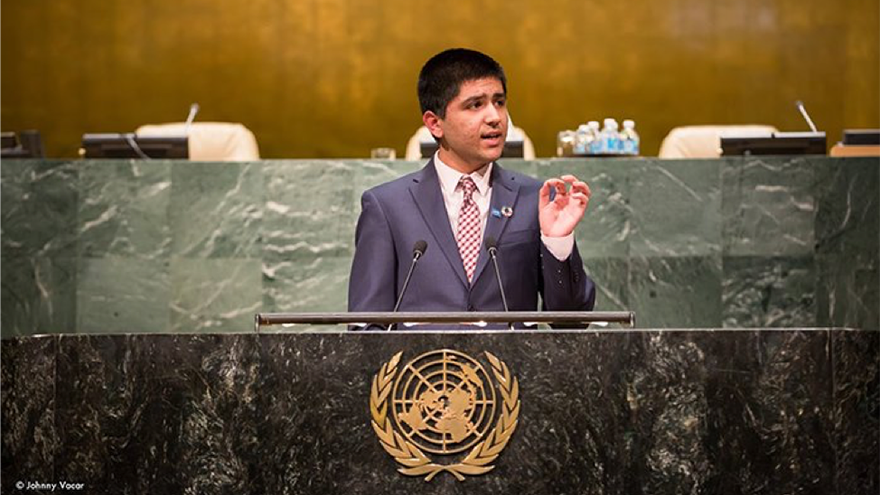From the UN to the Blavatnik School and beyond: channelling public policy to support women’s rights

It was 3 February 2017 – the 19th session of the United Nations Youth Assembly. As I stood at the podium as a youth delegate and surveyed the room of dignitaries, I suddenly felt a great weight of responsibility. Under its own volition my heartbeat increased suddenly and exponentially, but nevertheless, I confidently declared:
"I believe if a loan can empower a woman, it can empower a family.
If we can empower a family, we can empower communities.
If we can empower communities, then surely we can change the world."

Just three months after my speech at the UN General Assembly Hall I accepted an internship with the United Nations World Tourism Organization (UNWTO). At the time, I was still a student at Western University in Ontario, Canada, so balancing the six-month UN internship with my undergraduate studies, while also remotely leading my non-profit in Pakistan and applying for graduate school, required a lot of multitasking. After finishing my schoolwork I would pack my luggage, catch an overnight bus from Toronto to New York, transfer to the New York subway in the early hours of the morning, and arrive at my shared accommodation at the break of dawn to take a shower. Dressed in a blue suit and pink tie, with my official badge pinned to my chest, I would head out in time for my first meeting at 10:00, at the UN Headquarters General Assembly building. Nevertheless, I would not trade my experience for a 'normal' student schedule, as my time at the UN presented valuable lessons that could not be effectively learned from a textbook or lecture.
My assigned area of focus was sustainable tourism. As an advocate for women’s rights and economic empowerment, I used the opportunity to research sustainable tourism as applied to income-generating opportunities for women in developing countries. Specifically, I conducted interviews with northern Pakistani tourist communities and authored a case study which showcased how women of the Kalash indigenous community in Pakistan use tourism to preserve their culture from the shadows of the Taliban and create income generation opportunities for locals. To my surprise, my colleagues at the UNWTO Headquarters in Madrid took notice of my work and asked me to present the case study at the UN in New York, as a part of the celebration for the International Year of Tourism.
Today, however, we are faced with a daunting challenge. We are experiencing a reversal of the progress that has been made on women’s rights. As towns and municipalities close down due to lockdowns, women who work in the informal economy have not been able to generate income and their financial independence is being compromised. I Am An Entrepreneur (IAE), a non-profit I founded in 2012, is currently working with these women to help them remain afloat and not regress back into poverty. For instance, in 2017, 'Nusrat' received a microloan from IAE to launch a tailoring business. She used the funds to purchase fabric, machines and other sewing materials, and swiftly began generating income by sewing clothes for women and children in her community. However, with families struggling to make ends meet during the pandemic, her business has suffered significantly. In response, IAE provided Nusrat with a grant to train other IAE entrepreneurs in stitching. Together, they have been producing masks and PPE for community members and hospital staff.
Nusrat’s pandemic story is just one of many. The international community must come together to fight the effects of this pandemic, especially in support of low-income rural women. Furthermore, as a result of stay-at-home orders, coupled with many women lacking financial independence, there has been an uptick in spousal abuse, particularly against women. UN organisations should offer strategic coordination and advice to governments to address the 'shadow pandemic' of rising violence against women. Also, humanitarian assistance should focus on women’s needs – particularly funding women’s shelters and providing financial aid to women-owned small- and medium-sized enterprises. Finally, the UN should advocate that member states collect disaggregated data on the gender-specific effects of this pandemic in order to inform gender-responsive policies.
At age 21, I started the Master of Public Policy at the Blavatnik School of Government as the youngest member of the 2018 class. What gave me the courage to engage in rigorous debate with my fellow classmates – whose years of experience were in some cases equivalent to my age – was the recognition that my ideas were not merely theoretical, but were inspired by real Pakistani women and real communities. In the same fashion that being the youngest member of my Oxford cohort did not stop me from advocating for women’s empowerment, a global pandemic will not deter me from creating initiatives to help local women weather the resulting economic storm. My hope is that the international community will come together to work towards a common goal of empowering women, especially in the midst of this unprecedented global health crisis. If a woman’s small business is able to survive the economic upheaval caused by COVID-19, then families will survive. If families survive, then communities will survive. If communities survive, then surely we, as a global community and economy, can survive this pandemic without losing the gains that have been made for women’s empowerment.
Syed Shoaib Hasan Rizvi (MPP 2018) is an alumnus of the Blavatnik School of Government, University of Oxford. He is the founder of I Am An Entrepreneur, a not-for-profit organisation that provides skills training, microloans and mentorship to women in Pakistan who have the passion to start their own ventures but lack resources.

